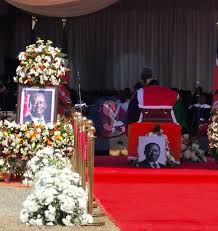
The death of former Prime Minister Raila Odinga does not bode well for Kenya’s democratic future, political scientist Prof Amukowa Anangwe has warned.
He described Raila as a political colossus, whose passing leaves a void too vast for the country’s fragile democracy to easily fill.
In a statement, he said Raila’s presence on the political stage since the 1990s had profoundly shaped Kenya’s governance and political culture.
“He was a man of many names—Agwambo, Tinga, Jakom, Jowi, Enigma—each reflecting a facet of his complex personality and towering political identity,” Anangwe said.
He said Raila’s death will trigger far-reaching consequences, including a weakened opposition and the possible resurgence of authoritarian tendencies.
“Kenyans should brace for leadership akin to authoritarian rule, brazen abuse of power and the decline of coalition politics in the post-Raila era,” he said.
“His exit forebodes ill for the citizenry.”
Anangwe credited Raila with entrenching the culture of forceful opposition that compelled successive regimes to reckon with him—whether through uneasy alliances, power-sharing arrangements, or marriages of political convenience.
He cautioned that Kenya might now drift towards a dominant-party system as the opposition, including ODM, loses its edge and the ruling UDA consolidates unchallenged control.
“The government’s legitimacy will further decline without a strong countervailing force to keep it accountable,” he warned.
“Expect less competitive multiparty politics as smaller regional parties get swallowed and many political careers will be upended as new players rush to fill the vacuum.”
Raila died of cardiac arrest while receiving treatment in India, medical officials at Devamatha Hospital in Kerala have confirmed.
In a statement released by the hospital on Thursday, doctors said the opposition leader collapsed during a morning walk at around 8:30 a.m. Indian time within the premises of the Ayurvedic wellness facility where he had been recuperating. Medical staff on-site administered CPR immediately before rushing him to Devamatha Hospital in Koothattukulam, where he was pronounced dead at 9:52 a.m.
The hospital said Mr. Odinga, 80, had been under treatment for diabetes, hypertension, and chronic kidney disease. A post-mortem examination is set to be conducted as part of routine medical and legal procedures.
According to Mathrubhumi.com, an Indian media outlet, Raila was at the Ayurvedic centre for rest and recovery following a mild stroke he suffered while in Kenya. A spokesperson for the hospital confirmed that he had been receiving regular care and was in the company of his family at the time.
The same hospital had previously treated his daughter, Rosemary Odinga, who regained her sight there after losing vision several years ago.
Indian authorities said information regarding Raila’s death had been relayed to the Foreigners Regional Registration Office (FRRO) for official processing in accordance with international protocol.
He was laid to rest at his Opoda Farm in Bondo, Siaya county, on Sunday—amid a sea of mourners who hailed him as a patriot and freedom fighter who gave Kenya his all.












